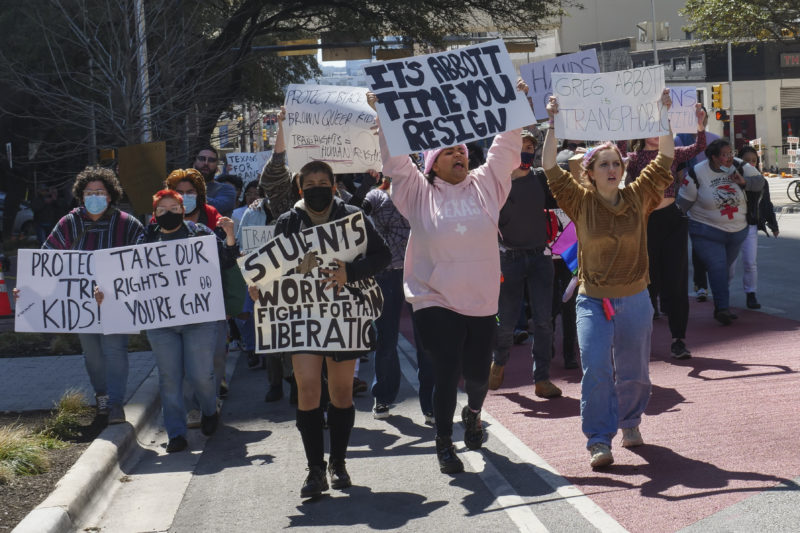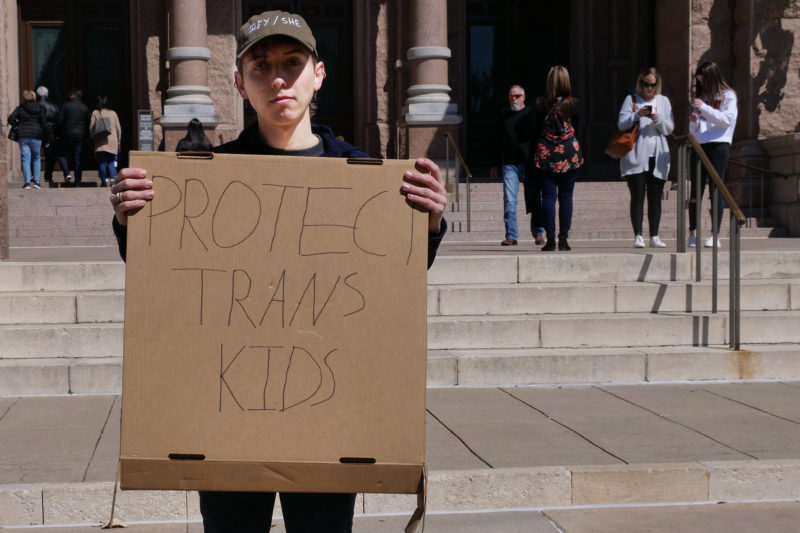Therapists: Calling Health Care for Trans Kids ‘Child Abuse’ Is Hateful and Dangerous
By Samuel Stark
Reporting Texas

Protesters march through downtown Austin, Texas, in February after Gov. Greg Abbott called gender affirming treatment child abuse. Laura Ullman/Reporting Texas
Central Texas counselors and psychologists who work with transgender adolescents say Texas politicians’ recent statements about trans therapy are an attempt to rile up voters at the cost of an extremely vulnerable community.
In a letter to the Texas Department of Family Protective Services on Feb. 22, Gov. Greg Abbott declared that aiding trans children in getting gender-affirming treatment should be considered child abuse and investigated as such. Abbott’s letter came four days after Texas Attorney General Ken Paxton issued a non-binding legal opinion labeling some types of gender-afirming health for minors as child abuse.
In his opinion in February, Paxton wrote that hormone therapy, puberty blockers and gender-affirming surgery can lead to sterilization, which he said would infringe on a right to procreation under the 14th Amendment to the U.S. Constitution. Paxton also suggested that sterilization techniques — such as, hysterectomies, castration and genital reconstuction — are being used on transgender children.
“These procedures and treatments can cause mental or emotional injury to a child that results in an observable and material impairment in the child’s growth, development or psychological functioning,” Paxton wrote.
Counselors and therapists say Paxton and Abbott have it backward.
“If you look at the literature, there’s nothing that indicates that (hormonal therapy) is psychologically harmful or psychologically destructive,” said David Zuniga, a clinical psychologist in Austin. “There is a clear message: LGBTQ children get support affirming their gender identities and their mental health challenges, if they have them, go down. When LGBTQ children don’t get support, their mental health challenges increase.”
Gender-affirming hormone therapy with estrogen and testosterone and puberty blockers, which delay unwanted physical changes for trans youth, have been used to help trans adolescents with gender dysphoria. A Stanford Medicine study of the the largest group of transgender adults ever surveyed concluded that trans adults who started hormone therapy as adolescents are more comfortable with their bodies and have better mental health outcomes.
Instances of gender-affirming surgery under the age of 18 are exceedingly rare, said Kimberly Shashoua, an Austin licensed clinical therapist who has been helping trans and gender-queer adolescents for almost a decade.
“This is just a completely ridiculous bullying and posturing that is having a really monstrous effect on the kids and families here,” Shashoua said of Abbott’s and Paxton’s recent statements.
Transgender is an umbrella term that encompasses people who do not feel aligned with the gender they were assigned at birth, Shashoua said. The teens whom Shashoua works with have a wide range of experiences, she said.
Therapy involving transgender adolescents is nuanced, and hormone therapy is not used in all cases. Hormones are administered when a teenager is distressed by their developing body and after several sessions with a therapist, Shashoua said.
“There is a spectrum from dissatisfaction to outright body horror, where (their bodies) feel like this terrifying thing,” she said.
Teens may stop taking care of their bodies — stopping things like brushing their teeth, changing their clothes or taking showers. In those cases, if they don’t get the treatment they need, serious mental health implications can follow, Shashoua said.
Parents of kids who experience body horror often start seeing positive changes after they begin hormone therapy. “(The kids) are showering now, and (the kids) seem to care about themselves,” Shashoua said
Mary Mattis, a psychotherapist from Austin, has worked with transgender clients for almost 20 years. If hormone therapy is appropriate, the therapist will send a letter of support to a doctor, she said. That does not occur before age 12, she added.
“I’ve seen and met many people before who didn’t get support of their transgender condition when they were younger,” Mattis said. “Many of them felt suicidal. Many felt alienated and struggled to socialize … because they couldn’t show who they were.”

A protester stands in front of the Capitol in Austin, Texas, prior to the start of a rally against Gov. Greg Abbott’s directive that labels transgender affirming treatments for youths as child abuse. Laura Ullman/Reporting Texas
Abbott’s letter could have a devastating effect on mental health support for trans adolescents, Mattis said.
“Those of us who support them and want to encourage their exploration of who they are, find where they fit in the world, and how to fit their best — whether it’s staying in their given gender or transitioning — I don’t think it feels like we’re allowed to do that anymore, or we could be reported and accused of child abuse,” Mattis said.
For a family with a transgender person, it has not been easy to live in Texas during the last few years because of frequent attacks on trans rights by top government officials, Shashoua said. But Abbott and Paxton’s recent comments are pushing some over the edge, she said.
“It’s heartbreaking. I think a lot of parents feel like they’re caught in the middle of a culture war,” Shashoua said. “Kids, no matter where they are, deserve competent care … (I want) these kids to know, I see you and I love you. Even though these people try to score points by inflicting harm upon you, I am not going to go away.”
Or, as Zuniga put it, “The psychopathology isn’t inside children; it’s inside our society, and exemplified by Greg Abbott and Ken Paxton.”